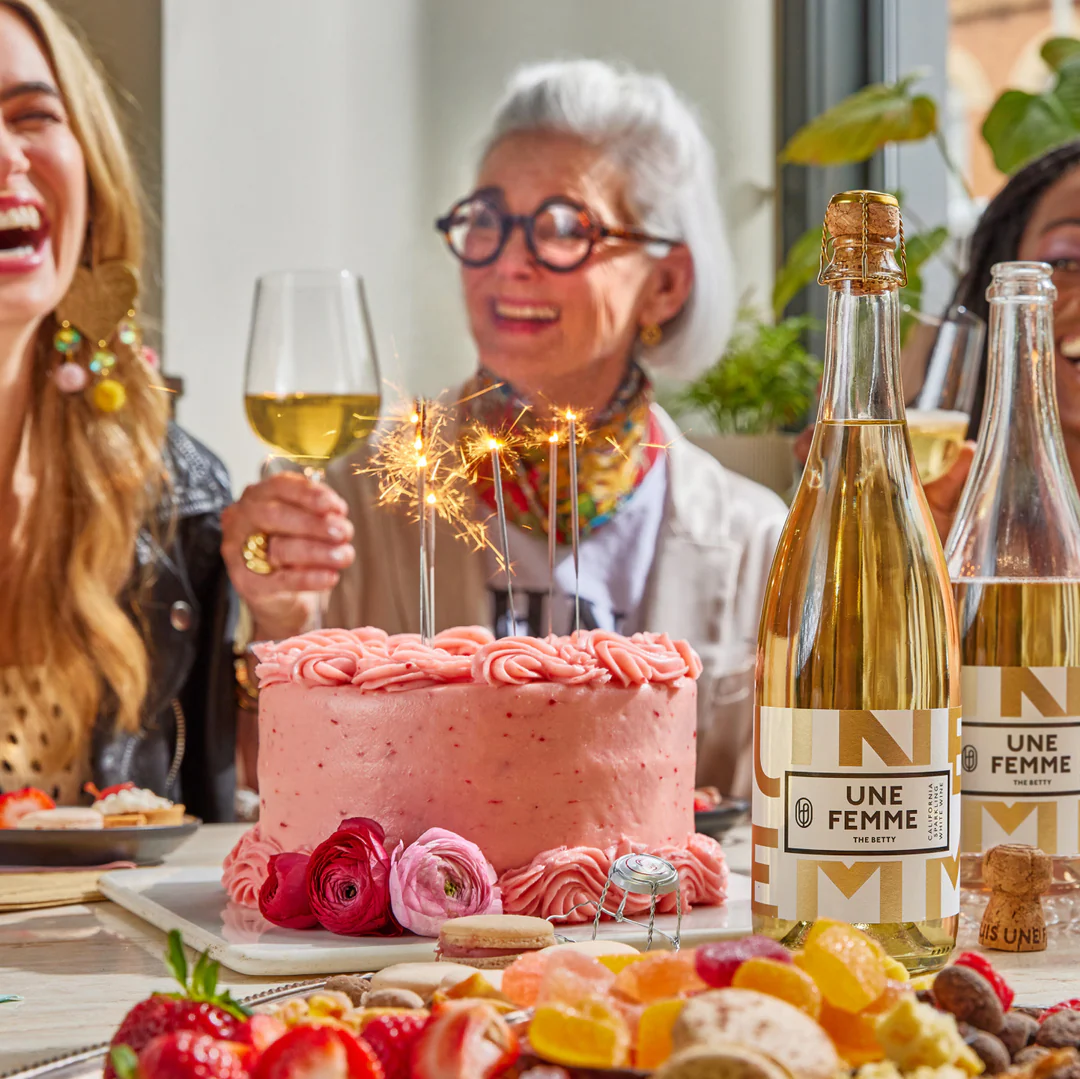Jen Pelka on Strategic Clarity: Why "First, Best, or Only" Determines Hospitality Success

When Jen Pelka received performance review feedback from her co-founder, who also happens to be her brother, the critique wasn't about financials or operations. It was simpler, and harder: "We need to have more fun."
After closing two locations of The Riddler during COVID, losing her home in the Healdsburg fires, and navigating her father's death all within the same period, Pelka had rebuilt Une Femme into a nationally distributed sparkling wine brand. The company was operationally excellent, financially disciplined, and positioned for growth. But somewhere in the grind of resilience, the joy had compressed.
That feedback became Une Femme's new tagline: "Pairs well with fun." It also represents something deeper about how Pelka approaches hospitality business, the recognition that strategic clarity isn't separate from human experience. It's the framework that makes sustainable growth possible.
The Framework: First, Best, or Only
Pelka traces her strategic methodology to a conversation at Magnum PR, the San Francisco restaurant communications agency she founded after working in Michelin-starred kitchens and corporate PR. During a champagne-and-popcorn happy hour in the basement office below The Riddler, New Yorker food editor Helen Rosner answered a question about what breaks through hundreds of daily press pitches.
"There's only really three things that break through," Rosner told the group. "You have to be the first, the best or the only."

That principle has structured every business decision since. The Riddler positioned as the best champagne bars in San Francisco and New York, a claim made easier by being first and only in those markets. Magnum PR aimed to be the best restaurant PR agency in San Francisco. Une Femme, after years of testing positioning around women-made wines and premium sparkling offerings, crystallized its strategy: become the best canned wine company in the country.
"You just have to decide what do you want to be the first, the best or the only," Pelka explains. "It needs to be really specific."
That specificity creates operational clarity. Une Femme now defines "best" across four measurable categories: largest market share (currently third, with competitors that have 15+ year head starts), highest quality (the only company canning monthly to ensure freshness), operational excellence (99.8% inventory availability), and strategic partnerships (working exclusively with category leaders like Delta, Marriott, and the Met).
Strategic Decisions Under Pressure
The decision to close The Riddler tested every framework. With two locations, substantial investor capital, and a beloved brand identity ("those places were so magical," as Hannah Collins Tate notes), the business question cut through emotion: Could the restaurants survive zero revenue with no pandemic end date visible?
"It felt like a massive failure," Pelka acknowledges. The disappointment wasn't just operational, it meant returning to investors, explaining closure, and unwinding leases while simultaneously processing personal loss.
But the strategic framework held. The Riddler had validated market demand for women-centered wine experiences. Une Femme existed as separate IP with its own investor base. The closure became a pivot point rather than an endpoint.
"We had family as a brand with separate IP," Pelka describes the calculation. "And what can we do to build this?"
Operational Reality: The Wine Business Challenge
Scaling Une Femme revealed why Pelka routinely advises founders against entering wine and spirits: "I tell people all the time, don't do it. I think it's way harder than restaurants. It's way harder than launching a traditional CPG brand."
The three-tier distribution system requires navigating state-by-state compliance, distributor relationships that sit between producer and customer, and significant capital requirements. Where restaurants offer direct customer feedback and revenue, wine brands face regulatory complexity that compounds with every state expansion.
The solution has been methodical partnership strategy. Rather than pursuing broad distribution, Une Femme identifies the top three potential partners in each category, aviation, hotels, entertainment venues, and pursues the number one.
"We know that the best customers are flying on Delta," Pelka explains the logic. "They are going to the Metropolitan Museum of Art, they are shopping at Neiman Marcus. They are staying at Marriott and Hilton Hotels. These are our partners, and they matter to us because they have the best customers."
Those partnerships create discovery moments in environments where customers already demonstrate purchasing behavior. They also enforce operational standards, partners with high expectations keep internal execution sharp.
Resilience as Operational Capacity
The conversation addresses what Jacob Cross calls "the vulnerability of how you've been able to be the best in public relations, be the best in the champagne bar in the country, and now your mission to be the best within film wine."
Pelka's response avoids inspirational framing: "The people who make it are the ones who just keep going. And it's a decision that you make."
She references a video (worth finding in the show notes) of an artist on a trampoline attempting to reach ascending stairs, jumping, falling, climbing, falling again, gradually progressing through repeated attempts. "To me, it's the perfect analogy of what it's like to be a founder."
When burnout hit last year, manifesting as questioning rather than momentum, the solution came through refreshed context. A January trip to Japan, seeing Une Femme in Tokyo Station's Dean & DeLuca, drinking the wine from a bento box on a bullet train, reignited the work's freshness.
"I think my only advice to people is if you are a founder, you just have to know that you're going to go through moments and slumps that feel hard and challenging in the business," Pelka reflects. "You kind of just have to write it out."
Evolution of Mission-Driven Positioning
Une Femme's origin as a women-centered wine brand reflected The Riddler's customer base, rooms "bursting at the seams with really incredibly fashionable women of all ages getting together for drinks and to toast to one another." Guests consistently requested women-made wines, which outsold everything else.
Five years later, that positioning requires evolution. "I do feel like with the conversation we got ourselves a little bit in a box," Pelka notes. What began as newsworthy differentiation, The Riddler's all-women investor base, Une Femme's focus on female winemakers, has become "this should be table stakes at this point."
The brand now leads with product quality, operational excellence, and community gathering rather than explicit gender focus. The female-led structure remains core, but operates in the background. "This is a cool brand. It happens to have a female CEO, but it also happens to have a male co-founder who's my brother."

This evolution reflects broader industry shifts around mission-driven businesses, the recognition that diverse leadership should be standard rather than remarkable, that overperformance matters more than positioning alone.
The Co-Founder Relationship
Building Une Femme with her brother Zach creates accountability that pure professional partnerships lack. Quarterly reviews include feedback like "we need to have more fun", observations that only sibling relationships can deliver with full honesty.
"The thing that I'm most grateful for with this company is the relationship that I have with my brother," Pelka says. "We push each other every day to think bigger, to push further to have more fun."
It's also structured around complementary strengths. While Pelka drives brand vision and strategic positioning, Zach leads operations, the supply chain precision that enables 99.8% inventory availability and monthly canning schedules.
Strategic Clarity as Competitive Advantage
Near the episode's conclusion, Pelka articulates the practical value of positioning frameworks: "When you find the thing that you are and you can go deep on that, it just makes it so easy."
Hannah Collins Tate reflects on implementing similar clarity for ROY: "I said I want to be the best restaurant design studio in America. And it was like, once you say it, you're like, oh, well, now we know how to get there."
That clarity enables decision-making efficiency, immediate yes/no filters on partnership opportunities, marketing initiatives, product development. It creates alignment across teams without requiring constant communication overhead. It makes "engineer for awesome" (one of Une Femme's ten company values) actionable rather than aspirational.
Strategic positioning isn't marketing polish on operational chaos. It's the structure that makes resilience possible, that transforms crisis into pivot opportunity, that converts years of grinding work into momentum.
As Pelka notes about her next goal, proving that a woman-led wine company can achieve private equity exit at scale, "I of course I want it because, like, I want to change the lives of everybody on my team and investors and myself. But I also want to do it just to prove it's possible and to, like, set the path for other people."
Strategic clarity with operational execution. Resilience as decision rather than disposition. Building businesses that pair well with fun.
Listen to the full conversation with Jen Pelka on Hot Gossip: https://creators.spotify.com/pod/profile/hot-gossip-podcast
